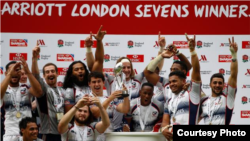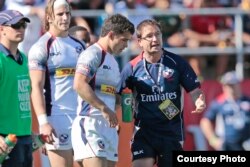The USA Rugby men's Sevens team is trying to reach another milestone this month by qualifying for the 2016 Olympics after winning its first-ever Sevens World Series tournament in London on May 17.
The Rio Summer Games will mark rugby's first appearance in the Olympics since 1924, when the U.S. men won a gold medal in the 15-a-side version of the sport.
The U.S. men's seven-a-side team can get a chance to try to emulate that historic achievement by winning a North America and Caribbean (NACRA) Olympic qualification tournament in the U.S. state of North Carolina June 13-14.
In that event the Eagles, as the U.S. men's Sevens players are known, are likely to face a final match-up against Canada, the region's only other highly-ranked team.
Beating the odds
Canada was one of several traditional rugby powers whom the Eagles beat convincingly at London's Twickenham Stadium last month on the way to winning their maiden Sevens World Series Cup title. The U.S. men also trounced hosts England - already qualified for the Olympics - in the Cup semi-final and Australia in the final.
London was the final leg of the annual nine-city international Sevens tour. It ended with the Eagles securing sixth place in a field of 22 nations - their best finish to date, but just short of the top four places that secured automatic entry to the Olympics.
Still, the London Cup victory has given the Eagles a confidence boost going into a potential re-match with Canada in the NACRA final, according to U.S. team member Danny Barrett.
"For the rest of the world, we are kind of known as a sleeping giant, so to be awakened a little bit going into the Olympics year is a big deal for us," Barrett told VOA.
Foreign expertise
Barrett attributes the Eagles' improved performance to a new coaching team hired last year, led by Englishman Mike Friday and his assistant, New Zealander Chris Brown.
Speaking to VOA by phone from London last week, Friday said he has been focussing on how to identify rugby talent in a country as vast as the United States, and how to create team unity among players of diverse cultural backgrounds.
Friday said he also has helped the Eagles to become better players, closing gaps in their tactical understanding of Sevens rugby and teaching them to boost their mental resilience and put the interests of the team above the individual.
But the U.S. head coach said he needs more investment in the sport to boost his team's prospects in the long run.
"If we qualify for the 2016 Olympics and get a medal, it will be in spite, not be because, of the existing U.S. rugby infrastructure," Friday said.
Focus on teenagers
Building that infrastructure at the U.S. high school level is key, according to Friday.
"We need to position rugby in high schools as a complement to American football and basketball, which students can become better at if they understand and play rugby," he said.
"The vast majority of college football and basketball players never make the transition to the professional National Football League or National Basketball Association. But if they learned to play rugby from the ages of 12 to 18, they can pick it up again at 22 or 23, and still have opportunities to become a professional player or represent their country as an Olympian."
Friday said high schools also need more rugby coaches who can teach the proper techniques. "If that means bringing in foreign help to coach the coaches, then so be it," he said.
The Englishman said making those investments in the next two to three years will put USA Rugby, the nation's governing body for the sport, in a stronger position for the 2020 Tokyo Olympics.
"So by 2020, you will have a bigger pool of athletes and rugby talent to pick from. And that is when the real beast, the real sleeping giant will awaken," he said.







